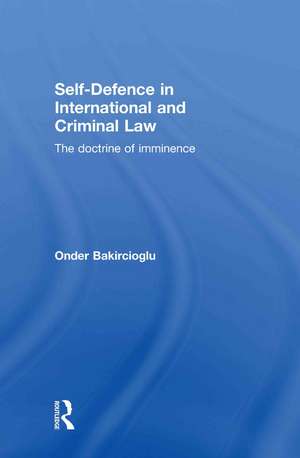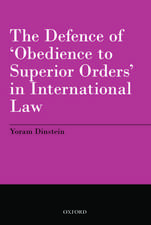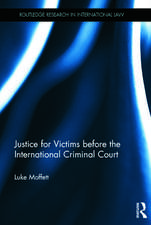Self-Defence in International and Criminal Law: The Doctrine of Imminence
Autor Onder Bakirciogluen Limba Engleză Hardback – 10 mai 2011
The book surveys the roots, role, rationale, and objectives of self-defence and questions whether the requirement of imminence should be removed from the traditional contours of the self-defence doctrine in national and international law.
| Toate formatele și edițiile | Preț | Express |
|---|---|---|
| Paperback (1) | 418.13 lei 6-8 săpt. | |
| Taylor & Francis – 12 apr 2013 | 418.13 lei 6-8 săpt. | |
| Hardback (1) | 1062.98 lei 6-8 săpt. | |
| Taylor & Francis – 10 mai 2011 | 1062.98 lei 6-8 săpt. |
Preț: 1062.98 lei
Preț vechi: 1296.31 lei
-18% Nou
Puncte Express: 1594
Preț estimativ în valută:
203.40€ • 212.94$ • 168.30£
203.40€ • 212.94$ • 168.30£
Carte tipărită la comandă
Livrare economică 05-19 aprilie
Preluare comenzi: 021 569.72.76
Specificații
ISBN-13: 9780415594226
ISBN-10: 0415594227
Pagini: 288
Dimensiuni: 156 x 234 x 18 mm
Greutate: 0.69 kg
Ediția:New.
Editura: Taylor & Francis
Colecția Routledge
Locul publicării:Oxford, United Kingdom
ISBN-10: 0415594227
Pagini: 288
Dimensiuni: 156 x 234 x 18 mm
Greutate: 0.69 kg
Ediția:New.
Editura: Taylor & Francis
Colecția Routledge
Locul publicării:Oxford, United Kingdom
Public țintă
Postgraduate and UndergraduateCuprins
Introduction 1. The Doctrine of Self-Defence and its Limits in Criminal Law 2. The Laws of War and the Roots of International Self-Defence 3. From Sovereignty to Unilateralism: A Critique of the Preventive War Doctrine 4. The Role and Rationale of the Imminence Requirement in National and International Law 5. Conclusions
Recenzii
"Bakircioglu explores the state of international law regarding self-defensive preemptions by states in the wake of war or blatant abuse of it by the US in invading and occupying an Iraq that posed no possible threat. He covers the doctrine of self-defense and its limits in criminal law, the laws of war and the roots of international self-defense, a critique of the prevention of war doctrine from sovereignty to unilateralism, and the role and rationale of the imminence requirement in national and international law."—Book News
Descriere
The book provides a broad and interdisciplinary approach to the doctrine of self-defence in both domestic criminal and international law. In particular it focuses on the requirement of imminence, which deals with the question of when individuals or States may legitimately resort to defensive force against a serious danger or harm.
Drawing from scholarship across law, history, politics and philosophy, this book explores the permissibility of employing preventive force under the law of individual and national self-defence. The book illustrates how the law of international self-defence, and in particular the requirement of imminence, has been subjected to controversy in parallel with its domestic counterpart. In both disciplines the debate over imminence is centred on similar concerns, issues and tensions despite the fact the arguments put forward are designed to address different scenarios. The book surveys the roots, role, rationale, and objectives of self-defence and questions whether the requirement of imminence should be removed from the traditional contours of the self-defence doctrine in national and international law.
Drawing from scholarship across law, history, politics and philosophy, this book explores the permissibility of employing preventive force under the law of individual and national self-defence. The book illustrates how the law of international self-defence, and in particular the requirement of imminence, has been subjected to controversy in parallel with its domestic counterpart. In both disciplines the debate over imminence is centred on similar concerns, issues and tensions despite the fact the arguments put forward are designed to address different scenarios. The book surveys the roots, role, rationale, and objectives of self-defence and questions whether the requirement of imminence should be removed from the traditional contours of the self-defence doctrine in national and international law.


















